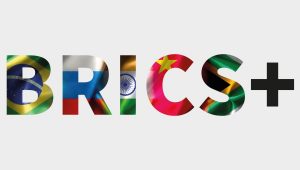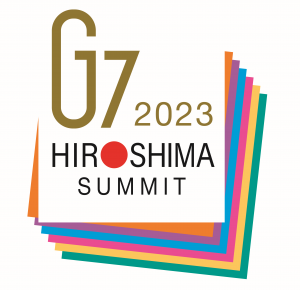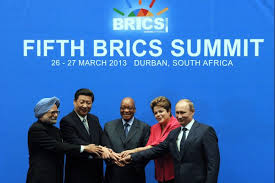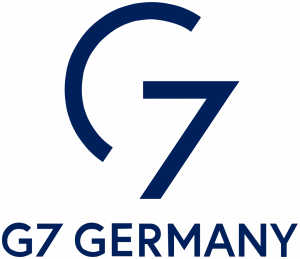
The UN General Assembly’s High Level Week has come and gone. And so has the unique UN gathering – The ‘Summit of the Future’ with the passage of the long anticipated, ‘Pact for the Future’. So, it’s not surprising that those of us concerned with global governance, global order and global summitry have turned our attention to the – Informals and most evidently the upcoming two Summits – the G20 Summit hosted this year by Brazil and the BRICS+ Summit hosted by none other than Russia. As it turns out, the third key Informal, the G7 has already been held by Italy in Apulia on June 13-15th.
The Informals emerged in 1975 with the creation of the G6 then the G7 a year later. While the G7 enlarged to the G7/8 in 1998, with the inclusion of Russia, it returned to being the G7 in 2017 when Russia that had been suspended with its annexation of Crimea in 2014, abandoned the Informal for the G20. The G20 began in 1999 with finance ministers and central bankers. It evolved into a leaders summit with the global financial crisis in 2008. The G20 members in attendance at the first Leaders’ Summit called by George W. Bush were: Argentina, Australia, Brazil, Canada, China, France, Germany, India, Indonesia, Italy, Japan, Republic of Korea, Mexico, Russia, Saudi Arabia, South Africa, Türkiye, the United Kingdom, and the United States. The BRICs called their first leaders gathering in Yekaterinburg Russia in 2009. It emerged as the BRICS with the addition of South Africa at the Sanya China meeting in 2011. These three, the G7, the G20 and the BRICS have remained the key informal annual leaders’ summits. The question remains, however, how effective have these 3 Summits been? Have they been able to shape the global order and advance collective global governance leadership? In other words, have they been effective?
Let me first focus on the BRICS+. This year’s gathering is the first convening of the BRICS+, an enlarged BRICS group. This year’s Summit is significant for the current member enlargement but also for its hosting by Russia. Yes, this year the BRICS+ is hosted by Russia – a pariah for the West due to the Ukraine War. My colleague, Stewart Patrick, a senior fellow and director of the Global Order and Institutions Program at the Carnegie Endowment for International Peace (CEIP) published a BRICS+ piece on September 9, titled, “BRICS Expansion, the G20, and the Future of World Order”. On the first point, enlargement, Stewart suggests:
Putin has also invited more than two dozen other countries that have applied for or are considering membership in the expanding club. The gathering is meant to send an unmistakable signal: Despite the West’s best efforts to isolate it, Russia has many friends around the world.
This meeting in Russia will take place in Kazan the capital of Tatarstan. In addition to the original members – Brazil, Russia, India, China and South Africa, besides all the many invited guest there are the new members: Egypt, Ethiopia, Iran, Saudi Arabia, and the United Arab Emirates (UAE), though it should be noted that Saudi Arabia has technically not accepted membership but will attend in any case. Now Stewart’s explanation for this expansion:
No doubt, BRICS expansion evinces a growing global dissatisfaction with and a determination to challenge the structural advantages that advanced market democracies continue to enjoy in a global order that was in many respects made by the West, for the West. Reducing those exorbitant privileges, including by creating alternative, parallel institutions, is the fundamental purpose of BRICS+.
And the prospects of further expansion is highly possible. According to Putin, as described by Stewart:
According to Putin, thirty-four countries have expressed an interest to join the club, “in one form or another.” Some two dozen countries have reportedly applied for membership, among them Algeria, Azerbaijan, Bahrain, Bangladesh, Belarus, Bolivia, Cuba, Kazakhstan, Myanmar, Nigeria, Pakistan, Senegal, Thailand, Venezuela, and Vietnam. More may be waiting in the wings, like Indonesia, which applied and then withdrew its application a decade ago. The most recent applicant is Türkiye, a member of NATO—albeit one that seeks to keep its options open. The group, in other words, seems destined to expand.
So what are the goals and how effective has the current BRICS+ been. As noted above, the BRICS+ members loudly proclaim the need to add the Global South to the major multilateral institutions whether the UN, and especially the UN Security Council, or the major financial institutions, the World Bank and the IMF.
At the extreme, according to my colleague Oliver Stuenkel and his co-author Alexander Gabuev in a recent article in Foreign Affairs, titled, “The Battle for the BRICS: Why the Future of the Bloc Will Shape Global Order”:
Putin summarized the agenda of Russia’s BRICS presidency in remarks in July as part of a “painful process” to overthrow the “classic colonialism” of the U.S.-led order, calling for an end to Washington’s “monopoly” on setting the rules of the road.
But the makeup today, and likely in the near future, has its limitations as described by Oliver and his co-author:
But despite its allure, the club must grapple with an internal fissure. Some of its members, chief among them China and Russia, want to position the grouping against the West and the global order crafted by the United States. The addition of Iran, an inveterate adversary of the United States, only deepens the sense that the group is now lining up on one side of a larger geopolitical battle. Other members, notably Brazil and India, do not share this ambition. Instead, they want to use BRICS to democratize and encourage the reform of the existing order, helping guide the world from the fading unipolarity of the post–Cold War era to a more genuine multipolarity in which countries can steer between U.S.-led and Chinese-led blocs.
There clearly are differences in the view of its members as to what this Informal is designed to accomplish. And evidently not all members are equal. In particular China exerts strong influence on the original members and it, along with Russia, have pushed for expansion notwithstanding Brazil and India’s reticence:
Brazil and India are therefore wary of the BRICS’ hardening orientation. Both were initially opposed to China’s push to expand the group, which Beijing first proposed in 2017 under the rubric of “BRICS Plus.” Brazil and India were keen to retain the club’s exclusivity, worried that adding more members to the bloc would dilute their own influence within it. In 2023, China stepped up its diplomatic campaign and pressured Brazil and India to support expansion, mostly by casting their resistance as tantamount to preventing the rise of other developing countries. Keen to preserve its own standing in the global South, India dropped its opposition, leaving Brazil no choice but to go along with expansion. Brazil did lobby against adding any overtly anti-Western countries—an endeavor that failed spectacularly when Iran was announced as one of the new members that year.
It appears that the BRICS+ has taken on what appears to be a growing anti-western tilt and in the extreme case an anti-US position. In particular Russia, given its experience of US and European sanctions since the outbreak of war between Russia and Ukraine has urged the toppling of the US dollar dominance according to Alexander and Oliver:
In this fight against the Western “monopoly,” Putin identified the most important campaign as the quest to weaken the dominion of the dollar over international financial transactions. This focus is a direct result of Russia’s experience with Western sanctions. Russia hopes that it can build a truly sanctions-proof payments system and financial infrastructure through BRICS, involving all member countries.
But what has the BRICS accomplished beyond expressing distaste for the current global order leadership.
Stewart targets what he sees as the goals of the BRICS+ on the differences within:
On its face, BRICS+ is a formidable economic bloc,comprising half of the world’s population, 40 percent of its trade, and 40 percent of crude oil production and exports. The coalition can use this leverage not only to demand a more equitable international order but also to act on those ambitions, for instance by establishing a parallel energy trading system, deepening commercial links among members,creating an alternative system of development finance, reducing dollar dependence in foreign exchange transactions, and deepening technology cooperation in fields from AI to outer space. Expect BRICS+ to seek opportunities in each area.
Stewart also applauds various group actions:
Like the G7 and G20, the BRICS group has launched an expanding array of initiatives and partnerships across multiple issue areas, from energy to health to sustainable development. The result is an impressive and increasingly dense transnational latticework of networked minilateralism, with a heavy focus on South-South cooperation.
Yet the major collective BRICS efforts have been limited. In fact, we have two only: the New Development Bank (NDB) and a currency swap arrangement, the Contingent Reserve Arrangement (CRA) which has remained unused notwithstanding all the discussions of an alternative to the US dollar. As to the NDB it has not had a major financing impact with many criticizing it for relying too much on private financing. For an insightful discussion of the BRICS please listen to the podcast I undertook with York University’s Gregory Chin, “Summit Dialogue, S2, Ep 7, An Interview with Gregory Chin on the BRICS+ and the New Development Bank”
Frankly the collective efforts have been at best works in progress with far more rhetorical expression than practical implementation. As Stewart remarks:
To date, BRICS has been more effective at signaling what it is against—namely,continued Western domination of the architecture of global governance—than what it stands for.
And Alexander and Oliver further note:
In this fight against the Western “monopoly,” Putin identified the most important campaign as the quest to weaken the dominion of the dollar over international financial transactions. This focus is a direct result of Russia’s experience with Western sanctions. Russia hopes that it can build a truly sanctions-proof payments system and financial infrastructure through BRICS, involving all member countries.
The talk of de-dollarization is rife but the dethroning of the dollar is nowhere to be seen at the moment. So that is a first look at the expanded BRICS.
What then is the current status of the G20? First it should be noted the G20 has enlarged as well with the addition of the African Union in 2023. A key strength of the G20, unlike the G7, is that the G20 includes advanced economic and Global South members. In principle this wider membership corrects for the skewed membership of the G7 where no significant Global South members are present. This evident avantage has however fallen to the tensions generated in a far more geopolitical tense international system. Stewart reflects on the impact of the rising geopolitical tensions:
Of particular concern is the future of the Group of 20 (G20). Even before BRICS expansion, it had become a microcosm of growing global rifts. A further hardening of these divisions would undercut the G20’s fundamental raison d’être: namely, to help bridge gulfs between—and leverage the capabilities of—important countries that are not inherently or necessarily like-minded.
Among the biggest uncertainties is what impact the BRICS+ will have on the role and functioning of the G20, which will hold its own summit in Rio de Janeiro on November 18–19 under this year’s chair, Brazil.Since the G20’s elevation to the leader level in 2008, one of its ostensible comparative advantages has been that it provide a setting for flexible coalitions of consensus to emerge that transcend rigid blocs.
The expansion of BRICS certainly has the potential to exacerbate these dynamics, by splitting the G20 into opposed G7 and BRICS+ factions.
Though much anticipation was paid to the G20 broad membership, the geopolitical and now the ant-Western tensions reflected in the BRICS+ may hobble the very needed collective global governance efforts ascribed to the G20.
We will come back to the G20 as we approach the G20 Summit scheduled for November 18th and 19th, in Rio de Janeiro as we look to take the measure of G20 effectiveness.
Image Credit: LinkedIn
This Post was originally posted at my Substack, Alan’s Newsletter: https://open.substack.com/pub/globalsummitryproject/p/the-changing-shape-and-influence?r=bj&utm_campaign=post&utm_medium=web&showWelcomeOnShare=true


 Yup, a little late in the weekend it is. But then for some Monday is a holiday. Mea culpa, but I was deep into completing a draft chapter for a yet to appear volume – which, in fact is scheduled to be released by 2025. The publication year, by the way, is important. My chapter will be part of a planned edited volume by Edward Elgar Publishing. There will be many chapters, so I am told, that will review and analyze the G7. It will do so on the 50th anniversary of the initiation of the G7 Leaders Summit. Yup, Rambouillet, the acknowledged first G7 Leaders Summit – it was actually, the G6 – France, Germany, Italy, Japan, UK, US at that moment in time – met in 1975. All the chapters, I suspect, will cover aspects of this ‘First Informal’, the G7, and, I suspect, the other Informals as well – that is the G20 and the BRICS.
Yup, a little late in the weekend it is. But then for some Monday is a holiday. Mea culpa, but I was deep into completing a draft chapter for a yet to appear volume – which, in fact is scheduled to be released by 2025. The publication year, by the way, is important. My chapter will be part of a planned edited volume by Edward Elgar Publishing. There will be many chapters, so I am told, that will review and analyze the G7. It will do so on the 50th anniversary of the initiation of the G7 Leaders Summit. Yup, Rambouillet, the acknowledged first G7 Leaders Summit – it was actually, the G6 – France, Germany, Italy, Japan, UK, US at that moment in time – met in 1975. All the chapters, I suspect, will cover aspects of this ‘First Informal’, the G7, and, I suspect, the other Informals as well – that is the G20 and the BRICS.
